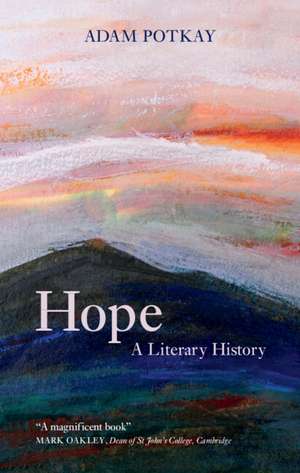Hope: A Literary History
Autor Adam Potkayen Limba Engleză Hardback – 26 ian 2022
Preț: 276.47 lei
Nou
Puncte Express: 415
Preț estimativ în valută:
52.90€ • 55.49$ • 44.04£
52.90€ • 55.49$ • 44.04£
Carte disponibilă
Livrare economică 12-26 martie
Livrare express 25 februarie-01 martie pentru 42.61 lei
Preluare comenzi: 021 569.72.76
Specificații
ISBN-13: 9781316513705
ISBN-10: 131651370X
Pagini: 434
Dimensiuni: 143 x 224 x 24 mm
Greutate: 0.71 kg
Ediția:Nouă
Editura: Cambridge University Press
Colecția Cambridge University Press
Locul publicării:Cambridge, United Kingdom
ISBN-10: 131651370X
Pagini: 434
Dimensiuni: 143 x 224 x 24 mm
Greutate: 0.71 kg
Ediția:Nouă
Editura: Cambridge University Press
Colecția Cambridge University Press
Locul publicării:Cambridge, United Kingdom
Cuprins
Introduction: For and against hope; 1. The limits of hope in the ancient world; 2. Eternal hope: The Christian vision; 3. The three hopes of humanism: Sacred, profane, and political; 4. Something evermore about to be: Hope in the Romantic era; 5. Later nineteenth-century responses to Romantic hope; 6. Modernism: Repetition, epiphany, waiting.
Recenzii
'Adam Potkay traces the fascinating, tangled history of hope through the centuries, from classical antiquity to the present day, moving with apparently effortless intellectual grace between literature, philosophy, political thought, and theology. It is a work of great humanity as well as immense but lightly worn erudition, a truly memorable account of this most ambiguous of all the virtues.' Seamus Perry, University of Oxford
'How hopeless is it to be hopeful? In this magnificent book, Adam Potkay takes us on a literary tour to discover how some have thought hope to be an illusion best avoided, whilst others have believed it to be a virtue that saves souls or effects political change. At a time when hope is spoken of as a positive emotion, but somewhat lacking in substance, this is an important contribution to help clarify whether reality is ultimately trustworthy enough to revitalise the concept for a new generation.' Mark Oakley, Dean of St John's College, Cambridge
'Hope: A Literary History is an impressive accomplishment, unusual in its breadth, deeply learned, and engagingly humane in sensibility. Hope is a virtue in common parlance, the optimistic face we turn against a bleak fate. But Potkay traces the origins of this virtue to an equally deeply rooted sense of hope as an irrational flight from reality. These contesting and opposed ideas of hope make for dramatic movements in intellectual history, from the classical and pre-Christian eras through the Enlightenment, Romanticism, and the successive modernisms and post-modernisms of the twentieth century. Potkay's unique gifts as a historian and reader make him an ideal and genial guide through vast and fascinating cultural territory.' Nancy Yousef, Rutgers University
'Hope has a history. Potkay traces this history through central literary texts from Greek antiquity to Camus and Beckett, appropriately supported by philosophical, theological and political reflections on hope. Presenting the shifting cases for and against hope with clarity and engagement, he invites his readers to face the challenge of hoping in a world of diverse desires. A great book!' Werner G. Jeanrond, University of Oslo
'… a model of literary history.' Micah Mattix, The Spectator
'Hope is seen as 'an unqualified good' today, Adam Potkay writes in his excellent history of the idea, … Potkay is a careful reader who makes fine, never forcing texts to say what they don't, and provides sufficient detail without muddying key distinctions. He shows that as long as there are humans, there will be hope, and that this is both a gift and a curse.' Micah Mattix, The Spectator
'How hopeless is it to be hopeful? In this magnificent book, Adam Potkay takes us on a literary tour to discover how some have thought hope to be an illusion best avoided, whilst others have believed it to be a virtue that saves souls or effects political change. At a time when hope is spoken of as a positive emotion, but somewhat lacking in substance, this is an important contribution to help clarify whether reality is ultimately trustworthy enough to revitalise the concept for a new generation.' Mark Oakley, Dean of St John's College, Cambridge
'Hope: A Literary History is an impressive accomplishment, unusual in its breadth, deeply learned, and engagingly humane in sensibility. Hope is a virtue in common parlance, the optimistic face we turn against a bleak fate. But Potkay traces the origins of this virtue to an equally deeply rooted sense of hope as an irrational flight from reality. These contesting and opposed ideas of hope make for dramatic movements in intellectual history, from the classical and pre-Christian eras through the Enlightenment, Romanticism, and the successive modernisms and post-modernisms of the twentieth century. Potkay's unique gifts as a historian and reader make him an ideal and genial guide through vast and fascinating cultural territory.' Nancy Yousef, Rutgers University
'Hope has a history. Potkay traces this history through central literary texts from Greek antiquity to Camus and Beckett, appropriately supported by philosophical, theological and political reflections on hope. Presenting the shifting cases for and against hope with clarity and engagement, he invites his readers to face the challenge of hoping in a world of diverse desires. A great book!' Werner G. Jeanrond, University of Oslo
'… a model of literary history.' Micah Mattix, The Spectator
'Hope is seen as 'an unqualified good' today, Adam Potkay writes in his excellent history of the idea, … Potkay is a careful reader who makes fine, never forcing texts to say what they don't, and provides sufficient detail without muddying key distinctions. He shows that as long as there are humans, there will be hope, and that this is both a gift and a curse.' Micah Mattix, The Spectator
Descriere
Compelling treatment of a question pervading literature from antiquity: when is hope a good thing and when is it not?
